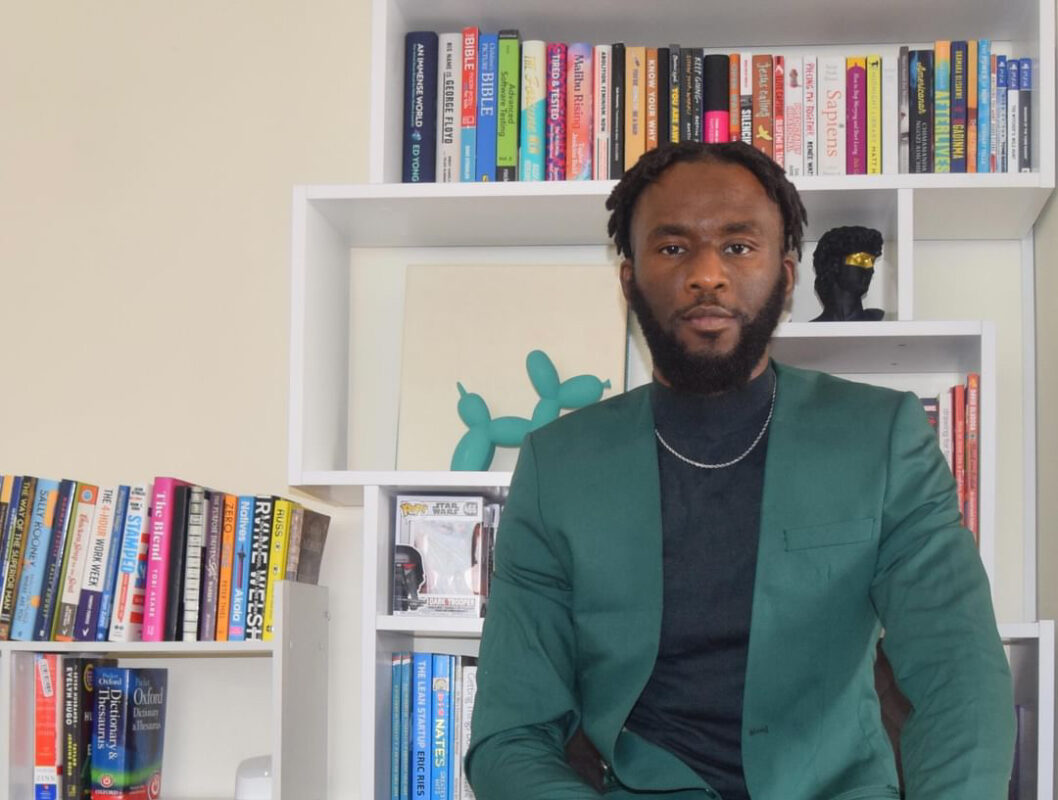Interviews
A Good Way To Explore a Boy Transitioning Into a Man~In Conversation With Tosin Akomolafe
Tosin Akomolafe is a young Nigerian author, making his debut with the novel Father-Time Continuum. He was born in Lagos, Nigeria, and now resides in the United Kingdom with his family.
Tosin has always had a deep passion for literature and cinema. As an avid reader and film enthusiast, he actively seeks out films that have been adapted from books. This passion sparked his desire to write as a hobby from his teenage years. Drawing inspiration from the world around him, Tosin brings a unique perspective to the beautiful story of Akándé, a dreamer whose path to fatherhood begins long before his own birth.
After reading Tosin’s Father Time Continuum(which I reviewed here), I reached out to him for an email interview which he graciously granted. I was very interested in the theme of fatherhood especially because it was set in Nigeria. Fatherhood and the relationship between fathers and sons are usually fraught in fiction but after reading this book where Akande had two fathers; his stepfather and his biological father, It got me thinking about that theme and what the reality of people who had more than one father was like.

Nnaemeka: Hello Tosin, thank you for taking the time to do this interview with me.
Tosin: Thank you for having me.
Nnaemeka: I want us to start from the beginning, and I know you addressed this in the book, but I also want us to address it as an outside concept. What was your biggest motivation for writing this book?
Tosin: My children are my biggest motivation for writing this book. This book went through so many iterations until I questioned what made me feel qualified to be a father. That became my driving conflict in the book and in my personal life. The truth is, in life, there are no certifications for fatherhood; it is a task thrust upon a man, the same as motherhood is a crowning glory for womanhood. So I thought, if I could tell a story of how we as humans are the sum of our cumulative learned experiences, that would be a good way to explore a boy transitioning into a man, and a man transitioning into a father.
Nnaemeka: The theme of family is something this book strongly explores: family, love, betrayal, and grief. The relationships with Akande’s father, grandfather, and grandmother play a significant role in the narrative. How did your personal relationships shape your message of family and time, and what do you hope readers will take away from these experiences as conveyed in the book?
Tosin: The human life span is relatively short. We live long enough to see 2 or 3 generations of family come before or after us. This means we are born as children to parents, most times with grandparents, in rare cases with great-grandparents. Then we, as children, grow older, experience the passings of those that are older, as we then become parents, grandparents, or even great-grandparents, and then we are gone. It’s the circle of life, and with that comes the reality of being surrounded by love and loss through grief. That really is the crux of Akande’s journey in this book: his search for an understanding of familial bonds, despite his family’s flaws. No family is perfect, and neither is Akande’s.
Nnaemeka: Your book, “The Father-Time Continuum,” is a fictional memoir. Can you share your inspiration for choosing this unique narrative style to tell Akande’s family’s history and personal journey, and how it parallels yours?
Tosin: I believe it’s Alfred Hitchcock who said, “Drama is life with the boring bits cut out.” So I knew the only thing that could make this story stand out from billions of memoir-type stories out there was to spice it up a little bit, with literary intrigue. Michelle Obama can get a book deal for millions of dollars and just do a tell-all book, with a bunch of rare childhood pictures, and it will do gangbusters in sales. I don’t have the luxury of being a well-known icon or celebrity, so the fictional memoir route seemed the most reasonable option. Even though the book is derivative of some of my lived experiences, unless you knew me in person, you wouldn’t really know which parts of Akande’s story mirror my life. Even my own father reading the book questioned what was real and what wasn’t, so I had to ask him to approach the book with some suspension of disbelief.

Nnaemeka: Mental health is not discussed enough in Nigerian homes. For instance, mothers who suffer from postpartum depression are not given adequate care; they’re not even acknowledged. In this book, we had a character, a mother, walk out on her child, never to be heard from again. How do you think we can all contribute to improving the mental health of one another?
Tosin: As much as I am no expert on the matter, I do believe mental health in general should be a part of the school curriculum. You don’t have to be running in the streets with tattered clothing to be regarded as someone with mental health issues. Anything from having a bad day at work due to stress to schizophrenia to suicidal thoughts is meant to be addressed and discussed in schools. We live in a society where we bottle up so much, most especially due to stigma, and women don’t talk to other women about things like post-partum depression. I think in addition to schools, community groups for mothers are essential, to check in on each other. Older mothers, before asking “Where is your husband?”, need to warn their unmarried adult daughters of the risks of mental health associated with motherhood too. Most people who go to visit a couple with a newborn would shove the parents out of the way just to make goo-goo gaa-gaa noises to a baby, who won’t remember them in the next hour, when they really should be asking about the parent’s mental health. Each one of us needs to be educated on the matter first and take individual accountability for looking out for our mothers, sisters, aunts, wives, daughters, friends, etc.
Nnaemeka: Akande’s time studying in the UK appears to be a pivotal part of the story. Can you discuss how your experiences in a foreign country influenced writing about self, family, and the passage of time?
Tosin: Moving from Lagos to London comes with a bit of culture shock, and then the dissonance follows. Living in Lagos for most of one’s life, you get used to a certain way of life. Even if you watch films, TV shows, and news clips about life abroad, it never truly prepares you like a lived-in experience. Then you may question your beliefs and morals, depending on how strong-minded you are. For instance, there is less judgement in London, where people can walk past you doing something silly and not care that you’re even there; meanwhile, in Lagos, make one wrong move in public, and strangers will give you a side-eye. As for the passage of time, the period captured in the book goes from Akande’s childhood to late twenties, which I purposefully used to capture his formative years. I wanted him to grow right in front of the reader’s eyes. Akande develops his nature through nurture from family interactions and differing environments, which subsequently affects the man he becomes.
Nnaemeka: Also, do you think Akande’s experience in the UK would have been different if his Uncle Taj was kinder?
Tosin: This may be spoiler territory here, so I will tread carefully. Every narrative plot requires a bit of antagonism, to push a protagonist(s) to their limits, and Uncle Taj seemingly fills that role in this story. Then again, from Uncle Taj’s perspective, he may be a good guy in his mind, while Akande was just getting in his way. The growth of Akande is proven when he and even the reader, question what choices would be made in morally questionable situations.
Nnaemeka: The concept of time seems to be a central theme in your book. How does your narrative explore the interplay between personal history, family legacy, and the broader context of historical time?
Tosin: Not to age myself, but I’m a millennial. I grew up in the nineties, when kids played outside a lot, long before coloured TVs. Long before TV stations were running for 24 hours straight; specifically between 4 pm and 11 pm. Then I experienced the dawn of the internet and mobile phones. So it feels like I have lived through generations already because things are always changing. In this book, we interact with family members from at least five generations, and there is something slightly different about the era they are born into. Though that aspect of my writing is passive, I wanted it to be there in the background, showing that we are in a world that keeps changing over time, yet some things never change.
Nnaemeka: “The Father-Time Continuum” is a highly personal work. What challenges did you encounter when translating your family’s history and your own experiences into a fictionalized memoir, and how did you balance the need for storytelling with the need for accuracy and authenticity?
Tosin: Though the book’s story is personal, Akande’s journey is very different from my life. I have more siblings and father figures than Akande does for starters. In the book, Akande moves to the UK in his teens, while I moved to the UK in my early twenties. Most importantly, none of my family’s names are used in the book. I asked my wife and parents to read rough drafts of the book first while letting them know this would be a fusion between fact and fiction. I got differing feedback, but more encouragement than disparagement. A lot of made-up characters are sprinkled around the book too. One major challenge was giving the majority of the characters resolutions and arcs that showed some sort of growth. Crafting a narrative that was cohesively tight was hard because even though the book has some finality to it, most of the people the characters are based on are still alive and still playing out their own lives in narrative divergence to my book.
Nnaemeka: What do you hope readers take away most from this book? What lessons, themes, etc.?
Tosin: We are all going through something, some situations tougher than others, but through faith and persistence, we can all overcome and hopefully learn some life lessons. So I hope readers laugh. I hope they are moved and find some characters they connect with in the book. I expect every reader’s experience to be unique, but universal in the book’s appreciation for life and the lessons we learn along the way. And as most of us will pass on the baton of our life lessons acquired over time, to those who come after us through parenthood, it is my hope that long after we are gone, our life stories live long through our children’s memories.
About The Writer: Nnaemeka Nnam is a Nigerian writer and bookstagrammer. He has been published or forthcoming at Nnọkọ Stories, W&S UK, and Isele Magazine. He is an alum of Sprin NG Writer’s Fellowship 2023 and Idembeka Creative Writing Workshop 2023. Nnaemeka wants you to embrace love, sadness and joy as they come. When he’s not obsessing over books on Instagram, they are wishing upon a star.
Father-Time Continuum is available here for NGN 10,000


